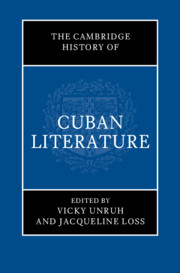Book contents
- The Cambridge History of Cuban Literature
- The Cambridge History of Cuban Literature
- Copyright page
- Dedication
- Contents
- Figures
- Contributors
- Acknowledgments
- Introduction Unfinished Histories
- Part I Literature in the Early Colony
- Part II Cuban Literature’s Long Nineteenth Century
- 3 Alexander von Humboldt and the Cultural Invention of Cuba Among Its Nineteenth-Century Intellectual Elite
- 4 Philosophy and Pedagogy in Félix Varela, José de la Luz y Caballero, and Enrique José Varona
- 5 Mercedes Merlin and the Rhetoric of Life Writing, Exile, and Race
- 6 The Lyric Vernacular of Cuban Romanticism
- 7 Gertrudis Gómez de Avellaneda as Literary Precursor and Transatlantic Intellectual
- 8 Racialized Futures
- 9 Journalism and Nineteenth-Century Literary Culture
- 10 José Martí as Hemispheric Visionary
- 11 Julián del Casal and the Other Faces of Cuban Modernismo
- 12 Performance Worlds of Nineteenth-Century Cuban Theater
- Part III Literary and Intellectual Culture in the Twentieth-Century Republic
- Part IV The Revolution’s Literary-Cultural Initiatives and Their Early Discontents
- Part V Cuba and Its Diasporas into the New Millennium
- Epilogue
- Select Bibliography
- Index
- References
6 - The Lyric Vernacular of Cuban Romanticism
from Part II - Cuban Literature’s Long Nineteenth Century
Published online by Cambridge University Press: aN Invalid Date NaN
- The Cambridge History of Cuban Literature
- The Cambridge History of Cuban Literature
- Copyright page
- Dedication
- Contents
- Figures
- Contributors
- Acknowledgments
- Introduction Unfinished Histories
- Part I Literature in the Early Colony
- Part II Cuban Literature’s Long Nineteenth Century
- 3 Alexander von Humboldt and the Cultural Invention of Cuba Among Its Nineteenth-Century Intellectual Elite
- 4 Philosophy and Pedagogy in Félix Varela, José de la Luz y Caballero, and Enrique José Varona
- 5 Mercedes Merlin and the Rhetoric of Life Writing, Exile, and Race
- 6 The Lyric Vernacular of Cuban Romanticism
- 7 Gertrudis Gómez de Avellaneda as Literary Precursor and Transatlantic Intellectual
- 8 Racialized Futures
- 9 Journalism and Nineteenth-Century Literary Culture
- 10 José Martí as Hemispheric Visionary
- 11 Julián del Casal and the Other Faces of Cuban Modernismo
- 12 Performance Worlds of Nineteenth-Century Cuban Theater
- Part III Literary and Intellectual Culture in the Twentieth-Century Republic
- Part IV The Revolution’s Literary-Cultural Initiatives and Their Early Discontents
- Part V Cuba and Its Diasporas into the New Millennium
- Epilogue
- Select Bibliography
- Index
- References
Summary
This chapter addresses the bountiful field of nineteenth-century Cuban poets, highlighting their transatlantic interactions with global Romanticism in creating a corpus of self-consciously “Cuban” literature that forged many of the foundational themes in Cuban political culture and rhetoric, including exile and an “amorous cathexis” to the island, all against the backdrop of racialized slavery and colonialism. Focusing on work by José María Heredia, Gertrudis Gómez de Avellaneda, Gabriel de la Concepción Valdés (Plácido), José Jacinto Milanés, Juan Francisco Manzano, Juan Clemente Zenea, and Luisa Pérez de Zambrana, and noting the embrace by Cuban poets of European poetry and lyric conventions, the chapter underscores in Cuban Romanticism the cultural role of the local tertulias of Domingo del Monte and Nicolás Azcárate; the vernacular contexts permeated by slavery and decrying its atrocities; the drive to alter Cuba’s colonial status; early reactions to European extractivism of New World resources; and racial and gender hierarchies, further complicated by the writing and reception of poetry by people of color and by women.
Keywords
- Type
- Chapter
- Information
- The Cambridge History of Cuban Literature , pp. 109 - 125Publisher: Cambridge University PressPrint publication year: 2024



